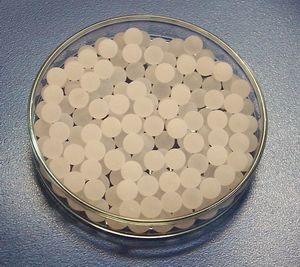Main Sector of relevance\IRC classification 11. Sciences (Chemistry, Physics etc)
11.43 Modified polymer carriers for enzyme-linked immunoassay

Developers’ contact information
State Scientific Institution “The Institute of Physical Organic Chemistry of the National Academy of Sciences of Belarus”
13, Surganov Str., 220072 Minsk
Summary
Solid-phase enzyme-linked immunoassay (ELISA) is one of the main methods used in biochemical trials and clinical diagnostics. The method is based on the use of immunosorbents: formed polymer with immobilized antibodies and antigens on the surface. To develop a diagnostic system of high quality the following factors shall be taken into account: carriers’ capacity (effectiveness of protein binding) and maintenance of biological activity of immobilized biomolecules at the highest level. To this end, small tooled balls 0.63 cm (1/4 inch) in diameter are used. The suggested technology exploits chemical modification of polystyrene balls surface that enables production of carriers with much greater capacity and biomolecules binding strength.
Description
Polystyrene balls 0.63 cm in diameter (1/4 inch, common standard) with chemically modified surface are used for immobilization (adhesion due to chemical bonding) of antibodies and other protein molecules
Technology type
Technical advantages and economic benefits
Chemically modified polystyrene carriers make it possible to immobilize up to 50 mcg/cm2 of antibodies or other proteins on the surface by means of covalent links, thus ensuring solid binding and maintenance of activity for a long time. The nature of chemical functional groups on the surface can vary enabling different types of antibodies binding, including binding oriented on maximum optimization of produced immunosorbents. 1000 balls may cost 100-200 US dollars (depending on the scale of production) that is 3 to 4 times less than the cost of analogue Pierce carriers.
Technology differentiation and uniqueness
The suggested material differs on the ground that immobilization of proteins on the surface takes place due to covalent links, while hydrophobic persorption is used for traditional carriers. The available commercial materials with analogue features are expensive. In the course of carriers production based on the suggested technology expensive reagents may be reused after a simple regeneration stage thus the overall price of final product may be significantly reduced
Context in which technology was identified
—
Technological keywords
Enzyme-linked immunoassay, ELISA, polymer fictionalization, immobilized proteins, polystyrene, carriers for immunoassay, antibodies, immunoglobulins.
Development Stage
Intellectual property rights
Range of applications
IFA is used for analysis of a number of infections (HIV, syphilis, hepatitis); determining of tumor markers, hormones, medical drugs, doping drugs, various physiological states (early pregnancy detection, pregnancy pathologies), etc. As solid-phase carriers, various polymer materials are used, balls occupying a significant part thereof. A number of diagnostic test-systems of Hoffmann la Roche, Abbott and other companies are based on the use of such balls (manufactures do not reveal the method of surface modification).
Classifier Used at the EU Innovation Relay Centres
Preferable Regions
Practical experience
—
Environmental impact
None.
Type of collaboration sought
Terms and restrictions
—
Available technical assistance